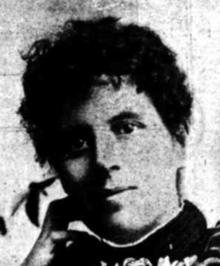Jennings Carmichael (24 February 1867 – 9 February 1904) was an Australian poet and nurse.
Jennings Carmichael | |
|---|---|
 | |
| Born | Grace Elizabeth Jennings Carmichael 24 February 1868 Ballarat, Victoria, Australia |
| Died | 9 February 1904 (aged 35) London, England |
| Occupation | writer |
| Language | English |
| Nationality | Australian |
| Years active | 1886-1904 |
Life
editGrace Elizabeth Jennings Carmichael was born on 24 February 1867[1] at Ballarat, Victoria.[1] The daughter of Archibald Carmichael, a miner from Perthshire, Scotland[1] and Margaret Jennings, née Clark, from Cornwall.[1] She was educated at Melbourne, while still a child went to live on a station at Orbost, and grew up close to the bush she came to love so much. She went to Melbourne to be trained as a nurse at the Royal Children's Hospital, Melbourne.[2]
Carmichael joined the Buonarottii Club before 1887,[3] and was a member of the Austral Salon in the 1890s giving a public lecture on "The Spirit of the Bush" in September 1895 at the Masonic Hall in Melbourne with Alfred Deakin as chairman.[4]
In 1891, Carmichael published a small volume of prose sketches, Hospital Children. Having qualified as a nurse she obtained a position on a station near Geelong, and subsequently married Francis Mullis. She contributed verse to the Australasian, and in 1895 Poems by Jennings Carmichael was published.[5][6][7]
Carmichael lived for a time in South Australia and then went to London, where she died of pneumonia in poor circumstances in 1904.[8] In 1910 a small selection of her poems was published, in 1937 a plaque to her memory was unveiled at Orbost, and a year later a replica was placed in the public library at Ballarat. Two of Jennings Carmichael's sons were present at the ceremony.
Jennings Carmichael wrote much good and pleasant verse with occasional touches of poetry. Brunton Stephens called Miss Carmichael the Jean Ingelow of Australia.[9] Comparisons of this kind have little value, but it may be said that Miss Carmichael's position in relation to the leading Australian poets, is not dissimilar to that of Miss Ingelow in comparison with Robert Browning and Alfred Tennyson, 1st Baron Tennyson.
Works
editPersonal life
editCarmichael married Henry Francis Mullis on 1 April 1895 in Fitzroy.[1] Carmichael had four sons and a daughter.[1]
References
edit- ^ a b c d e f Gardiner, Lyndsay, "Carmichael, Grace Elizabeth Jennings (1867–1904)", Australian Dictionary of Biography, National Centre of Biography, Australian National University, retrieved 17 January 2020
- ^ "Austlit - Jennings Carmichael". Austlit. Retrieved 17 June 2023.
- ^ Lawson, L. T. (10 August 1929). "The Argus Camera Supplement: The Buonarotti Club, Bohemians of the 'Eighties. Memories of Noted Artists". The Argus. p. 3. Retrieved 20 March 2023.
- ^ "THE SPIRIT OF THE BUSH". Argus (Melbourne, Vic. : 1848 - 1957). 19 September 1895. p. 6. Retrieved 17 January 2020.
- ^ McLaren, Ian F. (Ian Francis); University of Melbourne. Library (1986), Grace Jennings Carmichael, from Croajingolong to London : with an annotated bibliography, University of Melbourne Library, ISBN 978-0-86839-699-6
- ^ "MISS JENNINGS CARMICHAEL'S POEMS". Argus (Melbourne, Vic. : 1848 - 1957). 4 January 1896. p. 11. Retrieved 17 January 2020.
- ^ "POEMS BY JENNINGS CARMICHAEL.*". Australasian (Melbourne, Vic. : 1864 - 1946). 4 January 1896. p. 41. Retrieved 17 January 2020.
- ^ "Family Notices". Australasian (Melbourne, Vic. : 1864 - 1946). 19 March 1904. p. 36. Retrieved 28 December 2018.
- ^ Serle, Percival (1949). "Dictionary of Australian Biography Ca-Ch: Carmichael, Jennings". gutenberg.net.au. Retrieved 17 January 2020.
- ^ Carmichael, Jennings (1891). Hospital children: sketches of life and character in the Childrens Hospital, Melbourne. G. Robertson. ISBN 978-1-875308-11-8.
- ^ Carmichael, Jennings (1895), Poems, Longmans, Green and Co. ; Melbourne : Melville, Mullen and Slade, retrieved 17 January 2020
- ^ Carmichael, Jennings; Society, Lindsay Gordon Lovers' (1800). For some one's sake : a poem. Melbourne : Lindsay Gordon Lovers Society.
- ^ "Our Women's Page". Worker (Wagga, NSW : 1892 - 1913). 19 May 1910. p. 7. Retrieved 17 January 2020.